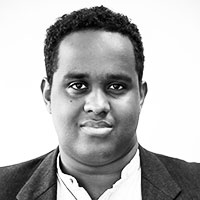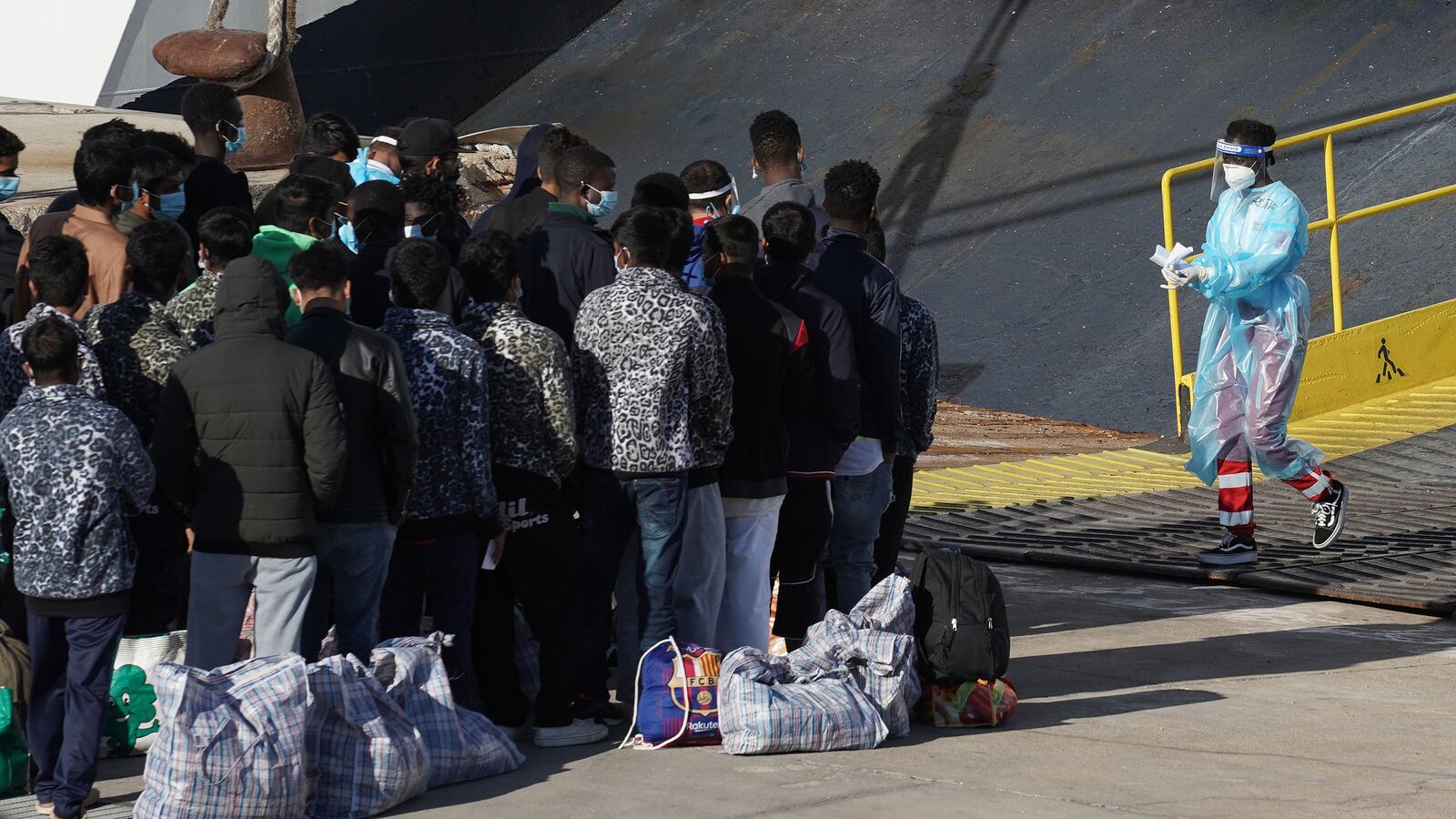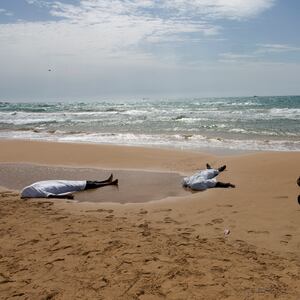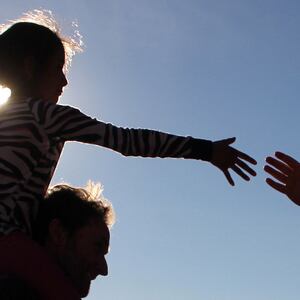This piece was originally published in Coda Story’s Disinformation channel.
PALERMO, Italy—On August 24, a cruise ship docked in the Sicilian port of Trapani. It was not, however, one of the many ordinary liners that typically call during the summer tourist season. Rather, it was what is known as a quarantine ship, carrying 603 migrants who had been transferred from the nearby island of Lampedusa.
Among the passengers was 17-year-old Ahmedou. His story had begun more than a year before in Burkina Faso, a landlocked West African country that has, for decades, suffered repeated droughts, famines and military coups. Since 2015, it has also experienced a surge of violence from militant Islamists that has left hundreds of people dead and up to one million more displaced.
During a telephone call from a Sicilian migrant shelter, Ahmedou described a journey, taking in Niger and Libya, where he was held in what he referred to as “connection houses” used by trafficking gangs and forced to work long hours on a farm to pay for his stay. Then, finally, came a perilous crossing of the Mediterranean Sea—waters in which more than 575 migrants have died in 2020, according to United Nations statistics.
“There was a lot of conflict in Libya,” he said. “We didn’t have any money and there wasn’t any work. So it was better to come here, even though I knew it was dangerous. The same day that we got on the boat, there were people who died at sea, but we had to go anyway.”
For Ahmedou and thousands more like him, the voyage to Sicily is a risk worth taking. Historically, the island has been an accepting and open place for migrants, but now that is changing. As they have elsewhere on the Italian mainland, right-wing politicians in Sicily have harnessed the coronavirus crisis to further their anti-immigration agendas, painting all outsiders as vectors of mass infection.
Five quarantine ships now operate in Italian waters. The use of such vessels began in April, while the country formed the epicenter of Europe’s COVID-19 outbreak. In response to the pandemic, the government banned migrant rescue boats from the nation’s ports. It then ruled that rescued migrants had to undergo a 14-day period of isolation at sea and be given COVID-19 tests prior to boarding and upon reaching Italy.
Migrants who arrive in southern Italy’s ports are meant to be transferred to reception centers and camps throughout the country, where they undergo further tests. These regulations mean that, far from being a dangerously unmonitored cohort of international super spreaders, migrants form what is probably the most closely observed group on the island in terms of the virus.
That fact has done nothing to prevent Sicily’s regional president, Nello Musumeci, from mounting a populist campaign of disinformation against them. On August 22, after months of escalating rhetoric, he posted on Twitter that, “Sicily can’t continue to submit to this invasion of migrants.” Then, the night before the ship carrying Ahmedou arrived, Musumeci issued an unprecedented decree, declaring that all migrants must be evacuated from the island and calling for an “immediate clearing of hot spots and migrant welcome centers” by midnight the following day.
The edict was ultimately unsuccessful, but it is a stark example of the inflammatory rhetoric that is now polarizing Sicily.
Words on the Street
One hot September afternoon on Piazza Verdi, in the heart of Palermo’s historic center, a group of activists held a small but vocal protest against the Italian government’s role in the prevention of NGO rescue missions in the Mediterranean.
Around them, ordinary Sicilians went about their daily business. Many were broadly empathetic toward those fleeing conflict and poverty-ravaged nations, proudly referring to the island’s centuries-long history as a center of international trade and crossroads of cultures.
“I think Sicily has always welcomed migrants, even if we have our own problems,” explained Ricardo, 24. “In Sicily, if there’s an opportunity to help migrants, then I am in favor of it, because you have to help your neighbors.”
Others, however, disagree.
One 59-year-old man, walking outside the Teatro Massimo, Italy’s largest opera house, spoke on condition of anonymity. “Musumeci represents all of Sicily, so, if he says it, for me it’s OK,” he said. “I think we’d all say what he said. He’s an intelligent person.”
Christiana, a 22-year-old law student also believed that migrants should be quarantined, in order to prevent the spread of COVID-19. “I don’t really see how else you could protect Italians,” she said. “If you let them off the ship, even a first contact would go to everyone else and that would be really very worrying”.
Musumeci’s ratcheting up of anti-migrant sentiment also appears to have had a detrimental effect on the lives of those already on the island. One balmy evening, I met with Ibra, a 22-year-old man from Guinea who has lived in Palermo for several years. He told me that he and his friends have noticed a distinct change in attitudes.
“Before we were not having these issues.” he said.
He explained that, alongside blame for the virus, deeper prejudices have started to emerge, with people openly telling him that “Blacks come here to steal our work, our women.”
“People say it’s true, but it’s not,” he added. “Right now I don’t see any future in Sicily.”
Turbulent Times
Sicily was largely spared the worst of Italy’s first wave of coronavirus infections. But, now, as the nation battles a resurgence of the disease, the island’s caseload is steadily rising. With a current total of 57,400 confirmed diagnoses and 289 deaths, the figures are worse now than they were during the spring.
Like the rest of the mainland, Sicily is now under a partial lockdown. In late October, the Italian government announced new restrictions, including the closure of gyms and cinemas, and reduced opening hours for restaurants and bars.
The announcement of those measures was greeted with unrest across the country. In October, demonstrations in Rome turned into full-blown riots between protesters and police. Meanwhile, in Naples, members of the far-right party Forza Nouva chanted about the ongoing “sanitary dictatorship” during violent clashes with law enforcement.
It is within this context of panic that Musumeci’s hardline approach is gaining traction. His sweeping August 23 proclamation declared that the “migrant hot spot” of Lampedusa and other centers in Sicily would be shut down and their occupants transferred to other parts of Italy. All arrivals of migrants by sea to Sicily were also to be banned.
As responsibility for migrants and migration lies with the national government. It was not clear how Musumeci’s plan could be executed. While Sicily is an autonomous region of Italy, the regional government only has responsibility for health and hygiene matters. Accordingly, many viewed his statements as a calculated confrontation with the national government—and, by extension, the EU—over immigration.
Of the 32,105 sea arrivals in Italy the year, 26,434 have made land in Sicily. While these figures are nowhere near those recorded in 2015, they are still significant. What is more, desperate and vulnerable people are still dying at sea. According to the International Organization for Immigration, there have been at least nine shipwrecks on the Mediterranean since the start of October, the worst of which claimed 74 lives near the coast of Khoms in Libya.
On August 24, the Italian Ministry of the Interior responded to Musumeci with a sharply worded statement on its website, underscoring that migration issues were its concern, not his. “The management of migration does not fall within the remit of regional governments but is regulated by national laws,” it stated. “Given this, it is difficult to understand how Musumeci’s ordinance is meant to work.”
On August 28, Musumeci’s decree was rejected by the Sicilian courts. Despite its failure, the mere attempt to pass such laws sent a powerful and divisive message to the people of Sicily.
The Other Side
In addition to the courts, Musumeci faces vehement political opposition on the island. Mayor Leoluca Orlando of Palermo is well known for his pro-migrant policies. In 2015, he blamed the European Union for migrant deaths in the Mediterranean, accusing it of presiding over a “genocide.” In February this year, he granted honorary citizenship to the captains and crews of two migrant rescue boats operating in nearby waters.
While left-leaning Sicilian figures have accused Musumeci of attempting to exploit the issue of migration for electoral gain, he has continued to hammer home his message on social media. In August, he posted on Facebook that “Sicily cannot be invaded, while Europe is turning a blind eye and the government is not enacting any pushbacks.” He also framed his plans as a positive intervention that would “stop Sicilians becoming racist.”
Matteo Salvini, leader of the far-right Liga party and Italy’s former deputy prime minister and interior minister, has praised Musumeci on Twitter, expressing the “utmost solidarity for the Sicilian governor” and describing his failed legislation as “exemplary.”
But, according to some critics, Musumeci may just be trying to cover his own back. The COVID-19 outbreak has placed severe pressure on a local healthcare system that was already suffering from years of underfunding, and people are deeply concerned about the spread of the virus.
Sitting at home In the bustling, multicultural Palermo neighborhood of Ballaro, local independent left-wing politician Fausto Melluso told me, “I think our president is always speaking about migrants to distract people, so we don’t judge him on what he is doing to protect us during the pandemic.”
Facts on the Ground
After 21 days at sea, Ahmedou was unsure what to expect on arrival in Trapani. When his quarantine ship finally made land, the relative comfort of regular meals and a warm bed in a shared cabin gave way to a new reality.
“When we got off, everything changed,” he told me.
Border officials presented Ahmedou with a document known as a “Respingimento differito.” It stated that he had no right to be in Italy and demanded that he exit the country within a week. Failure to do so would render him liable to criminal prosecution and a fine of up to €20,000.
“Nobody told us anything, They gave us a paper and someone explained to me later that it said I had to leave,” he said. “Why did they waste all this time? Why save us and then tell us to leave?”
No one told him that vulnerable migrants have a right under EU law to apply for asylum. Melluso explained that Sicilian border officials routinely present new arrivals with expulsion papers and that the lack of information and guidance appears to be a deliberate strategy.
“It's against the law, because they are excluding a lot of people from the possibility of applying for asylum,” he said.
As a minor from an unstable nation, Ahmedou had a solid claim. Instead, he was left stranded on the streets of Trapani, frightened and alone.
“They left us all there with the paper in our hands. They said they were looking for a place for us to go but they didn’t come back.” he said.
Eventually Ahmedou found out where to get a bus to Palermo. After hours on the road, he got off at Corso Vittorio Emanuele, a picturesque main street in the city’s historic quarter. There, he met Moussa Koulibaly.
Koulibaly, 27, came to the city from Guinea several years ago and now provides outreach services for migrants. He helped Ahmedou secure a place at a migrant camp run by a Christian mission, on the outskirts of the Sicilian capital,
More or less as soon as he arrived, the facility and several others across the island were declared “red zones” by the Sicilian authorities. As such, they are subject to a strict, police-controlled lockdown, during which no one is allowed in or out.
Since his arrival, staff at the camp have provided health advice and information about the coronavirus, but Ahmedou remains confused about what it is. “I still don’t really understand it—like I don’t even know what part of the human body it attacks,” he said.
Camp authorities have instructed occupants to wash their hands frequently, wear masks and follow social distancing protocols—all unenviable tasks in a cramped environment, filled with hundreds of people.
“They told us to try to keep our distance and not sleep in the space of someone else. but we’re all in there together. The doors fall off in the bathrooms, so you have to hold the door when you go to piss. Sometimes you can’t even manage to have any privacy,” he said.
Confining large numbers of people at close quarters without proper access to healthcare, sanitation, food and water creates a perfect environment for the coronavirus to spread. According to Ahmedou, conditions in his camp are worse than those he experienced in Libya—a nation with far fewer cases than Italy.
As the numbers continue to rise in Sicily, migrants are being portrayed as carriers of disease who endanger the health of the island’s inhabitants. Such inaccurate stereotyping protects no one and creates a toxic environment that places vulnerable people at risk. As long as populist politicians like Musumeci continue to misrepresent and scapegoat these new arrivals, it will be they who face the gravest threats.
Ahmedou spoke under an assumed name, in order to protect his identity
Ismail Einashe is a members of the Lost in Europe cross-border journalism project, which investigates the disappearance of child migrants in Europe









